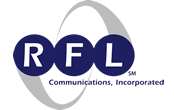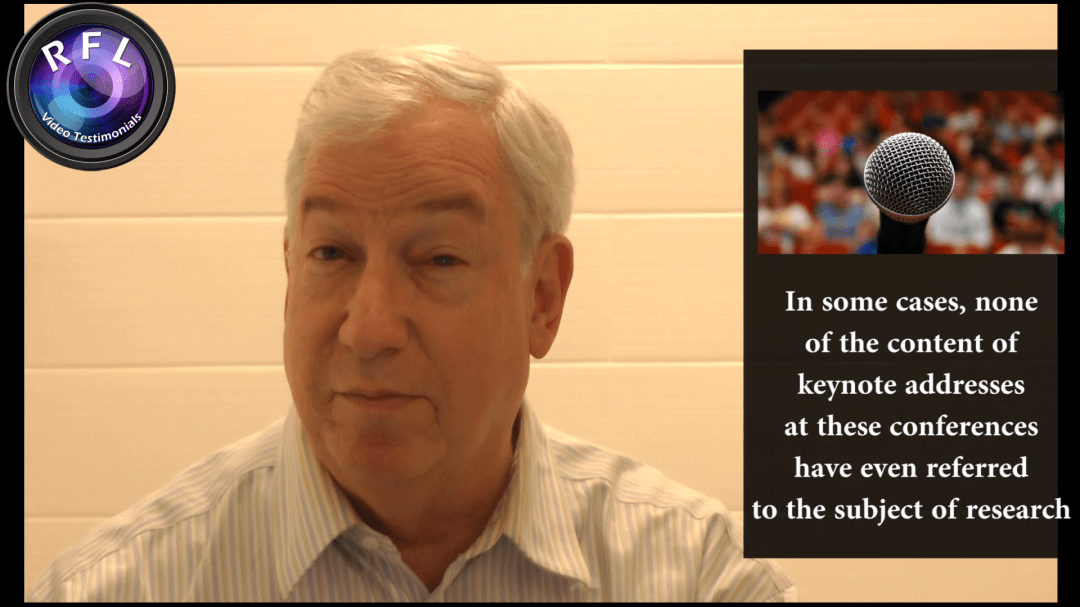October 26, 2017. Today on RBDR:
Bob Lederer’s thoughts about how 2017 research conferences could be improved.
(Important disclaimer: Bob has proposed being hired by some conferences to help them implement some of his ideas.)
This week’s RBDR is sponsored by RFL Video Testimonials, bringing a research agency/vendor’s happy, loyal customers and their experiences to life. Multiple versions of a highly loyal and appreciative customer’s video testimonials on your website can build your revenues and profits. It also builds perceptions about your products and services from an “AWARENESS” level to “CONSIDERATION” and to the ultimate goal, ADVOCACY.”
To view snippets from a sample Video Testimonial, please visit our main page and our publications page.
For details on how we can prepare an RFL Video Testimonial please click here.
No need to spend time “searching” for today’s RBDR video. Subscribe to receive a free, personal email as soon as the new RBDR is uploaded. Click here.


Very good summary, Bob.
Excellent practical advice from a seasoned veteran
I applaud your comments Bob and totally agree with you. I would also add a couple of my own pet complaints about conferences, which are tell me something new about our field or techniques and less about how wonderful your company and its products and services are. Tell me how we can solve problems like completion rates, panel professionals, and incentivize respondents to take our surveys, instead of providing gimmicks to increase your profit margins.
Nick, Thank you for your gracious comments. You are too kind! Yes, we try to offers ideas to help do away with problems.
Thank you, Bob, for this commentary which, to be honest, is not new news to any of the conference holders. However, let me let you in on a few of the obstacles and realities of putting on a large MR conference today. You rightly point out that exhibitors, who indeed pay a lot to showcase their wares, need to be placed where attendees have to go through them to get to the conference halls. Ideally, this is very true. However, in the US there are very few major cities in which there are venues that can actually accommodate this for a conference of, say, 800 attendees and 80 exhibitors. In New York, Chicago, San Francisco, Dallas – you name it – space in the major venues is limited and invariably spread over two floors – which drives us and our exhibitors crazy! To find such spaces, you either have to rent out space in a major event center (e.g. Javitz in NY), in which case you pay through the nose, deal with the unions and get lost in the cavernous surroundings; or go to a major resort such as Orlando which then is not as easy to get to for many people. We are already very aware that this is a problem that needs resolving – but, whatever the solution we come up with, remember that we book venues two to three years out, so you may have to wait awhile. I agree with you that ESOMAR got it right in Berlin – they also did so in Amsterdam this year by creatively siting 2 of their 3 stages actually in the exhibit halls.
You also cite papers where more upfront editing and review might tighten up content and perhaps reduce fluff and sales pitches. Agreed. But I want you to understand the supreme effort that goes into this. I chaired the Dublin ESOMAR Congress. We had a volunteer Programme Committee of 8 people, each of whom read 375 synopses. Out of these, 35 were chosen. We then read and edited all 35 papers until we were satisfied with them and then reviewed all 35 presentations and then put them all through rehearsals, where we insisted on fluff and sales being taken out. All in all, this was the result of thousands (not hundreds) of hours of effort put in by people who had volunteered and who were not being paid a dime. At the Insights Association, we go through the same process with our NEXT Conference. You have to realize that you are dealing with not-for-profit organizations with lean staffs who rely heavily on volunteers who put industry before their businesses to do this work. Do we always get it right? Of course not. But at least we are in there trying.
So, it’s very easy to comment from the sidelines and offer your no doubt expert services, but until you have been in the thick of it and put your industry ahead of your business to bring these events to fruition, it is also very easy to ignore and diminish the efforts of literally hundreds of people to lay on an event for you that you will enjoy and that will hopefully give you something to think about.
Simon, I take the words of unhappy exhibitors far more seriously than those who are putting on conferences. The same venues seem to host research events again and again. Vendor arguments and gripes that I spoke about last week on RBDR have not changed in 25 years.
Additionally, I take offense to your attempt to diminish me by claiming that I have put my business ahead of the industry and that my RBDR opinions look down on the efforts of hundreds of people who have worked on events.
I spearheaded the research industry’s original online data quality effort a decade ago – and was labeled a troublemaker by companies who realized that improving their data quality would cost them money. I put my reputation and business on the line. Many large research entities told my friends and business associates that it would be wise to stop working with me. Yet, we were so successful that several research associations jumped into the fray to curtail our efforts. I didn’t utter a negative comment about that, but I knew the effort would be pushed only “so far,” and today some of the same online data quality problems have re-emerged.
Kudos to you for your ESOMAR and Insights Association work, but you would not tell anyone that all you have done and continue to provide those two research associations is entirely from the heart and nothing more. No one devotes their time, intelligence and effort to an industry event without the expectation and the realization of personal business benefit.
I never question the work of those behind research conferences, but that does not mean that there is not room for improvement. There is a forceful need for creativity and a determination to do things differently from the way everybody else handles things.
My experience tells me that a committee that reviews papers creates a camel when its goal was a horse. Remember how Larry Gold used to write in Inside Research that there was nothing he had heard that was worth a researcher’s time at most conferences? More and more, I agree with him. Because of papers written by speakers, presentation technicalities and most detail are unnecessary, yet they predominate. We need to hear less of that and be exposed to more actionable knowledge and entertainment.
By the way, I fail to see any difference in that regard between profit and nonprofit conferences.
Finally, boxing exhibitors into an area half a football field away from the speaker ballrooms is a conscious decision that can and should be altered. Exhibitors will pay more for greater access to conference attendees; their falling ROI on booths is why exhibit areas are less and less populated.
Wow! Bob, you have outdone yourself! First of all, it was never my intention to “diminish” you by saying that you put your business ahead of the industry. If you thought that, my apologies, but it’s not all about you. I was referring to all the people that put the industry ahead of their business by taking part in organizing these events. And I am grossly insulted by your implication that the years I have put into MRS, ESOMAR, CASRO and now the Insights Association are not “entirely from the heart” and were informed in some way by a desire to advance my business. I love this industry and have devoted God knows how many man years to the detriment of my business working to advance and protect the profession. Do you think being Chair of the Insights Association is actually good for my business when I spend over half my working week working for nothing to advance and build the association into what I hope will be the key voice for the profession? If you do, you are nothing but deluded. Similarly, all those that serve on industry Boards and Councils, some of whom are from very large companies whose owners wish they would not do so as it distracts them from running their businesses. Do you think they do it to advance those companies or their careers?
Yes, you held one conference. Bravo! But I don’t think you have ever put yourself forward to serve on any industry board, committee or initiative that I know of – and yet you think that you can judge those that do? You, and others who snipe from the sidelines, are breathtaking in your arrogance – – and, yes, you diminish those that serve.
Whatever happened to civility? I didn’t know you were so sensitive. There’s no need for name calling. You are entitled to your opinion – and my opinion is as valid as yours.
Gentlemen,
This conversation has gone off the rails. I don’t think anyone doubts the integrity, passion and dedication that you both share for our industry.
The subject is “How to Improve Our Research Conferences”. I commend Bob for taking on real concerns that he heard from exhibitors.
And Simon, I applaud the fact that you acknowledge this is a problem worth solving.
I think we can agree that there are too damn many conferences. Most of these for profit events has turned the exhibit hall into a “run the gauntlet” experience for corporate researchers which makes it difficult for both suppliers and clients to learn about emerging tools. Clients want to learn, suppliers want to explain their advantages. The frustration of exhibitors to reach clients becomes exasperated during lean years.
For that matter, does the “exhibit hall” even make sense in the 21st century? Is there a better way to connect client needs with suppliers skills?
The best discussions come with passion. This is a discussion worth continuing.